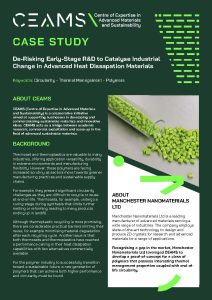CEAMS (Centre of Expertise in Advanced Materials and Sustainability) is a collaborative initiative aimed at supporting businesses in developing and commercialising sustainable materials and innovative ideas. CEAMS acts as a bridge between academic research, commercial exploitation and scale-up in the field of advanced sustainable materials.
Background
Thermoset and thermoplastics are valuable to many industries, offering application versatility, durability in extreme environments and manufacturing flexibility. However, these polymers are facing increased scrutiny as sectors move towards greener manufacturing practices and sustainable supply chains.
For example, they present significant circularity challenges as they are difficult to recycle or reuse at end-of-life. Thermosets, for example, undergo a curing stage during synthesis that limits further melting or reforming, leading to many products ending up in landfill.
Although thermoplastic recycling is more promising, there are considerable practical barriers limiting their reuse, for example minimising material degradation after each recycling cycle. Another issue is that both thermosets and thermoplastics have reached a performance ceiling in their heat dissipation capabilities with few alternatives commercially available.
For the polymer industry to successfully transition toward a sustainable future, a new generation of polymers that can achieve both higher performance and circularity must be found.
Manchester Nanomaterials Ltd is a leading manufacturer of advanced materials serving a wide range of industries. The company employs state-of-the-art technology to design and produce 2D crystals for research and advanced materials for a range of applications.
Recognising a gap in the market, Manchester Nanomaterials Ltd leveraged CEAMS to develop a proof-of-concept for a class of polymers that possess interesting thermal management properties coupled with end-oflife circularity.
Project
The project explored a like-for-like replacement of current thermal management polymers with improved end-of-life reprocessability by working with an advanced polymer material.
Such new polymers could offer industry a path forward in the green transition, but further investigations into their viability are needed before widespread adoption is possible.
The research undertaken by Application Scientists from the Henry Royce Institute (Royce) were conducted alongside work undertaken by Manchester Nanomaterials Ltd.
By utilising Royce’s world-leading facilities, the team were able to leverage extensive polymer synthesis capabilities with a broad range of characterisation and validation techniques.
Characterisation methods included differential scanning colorimetry (DSC) Fourier-Transform infrared spectroscopy (FTIR) and other analytical techniques.
Results
A proof-of-concept polymer was synthesised, and verification was considered a success. Looking ahead, CEAMS will support future work to build upon structural discrepancies to achieve reproducible and scalable results, with the goal of producing the polymer at scale.
Impact
The project has established a strong foundation for further collaboration between Manchester Nanomaterials Ltd and the Henry Royce Institute. Follow-up studies will focus on optimising the material properties, achieving the necessary performance metrics needed for industrial adoption, scaling up production and working with end users to validate performance in real-world applications.
Ultimately, CEAMS has helped to de-risk a promising direction of research by supporting high risk early-stage research and development, assisting research translation to advance the field of sustainable thermal management materials. With the support of CEAMS, Manchester Nanomaterials Ltd has laid the foundation to expand into a new market.
"This project with CEAMS has laid the groundwork for a new generation of functional sustainable polymers. We are excited to continue developing these sustainable polymers, with the aim of delivering a material that not only meets the performance demands of industry but also contributes to a more circular economy."
Manchester Nanomaterials Ltd




